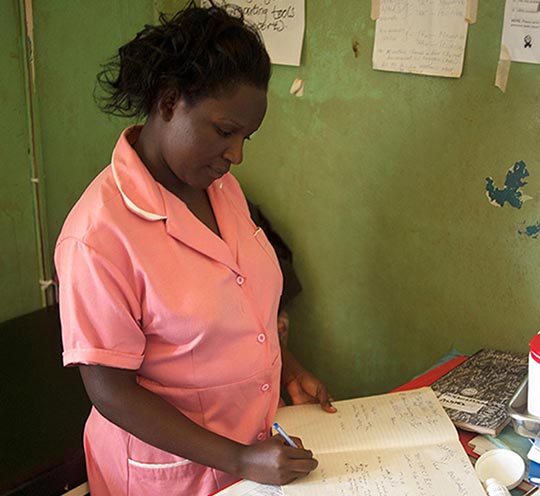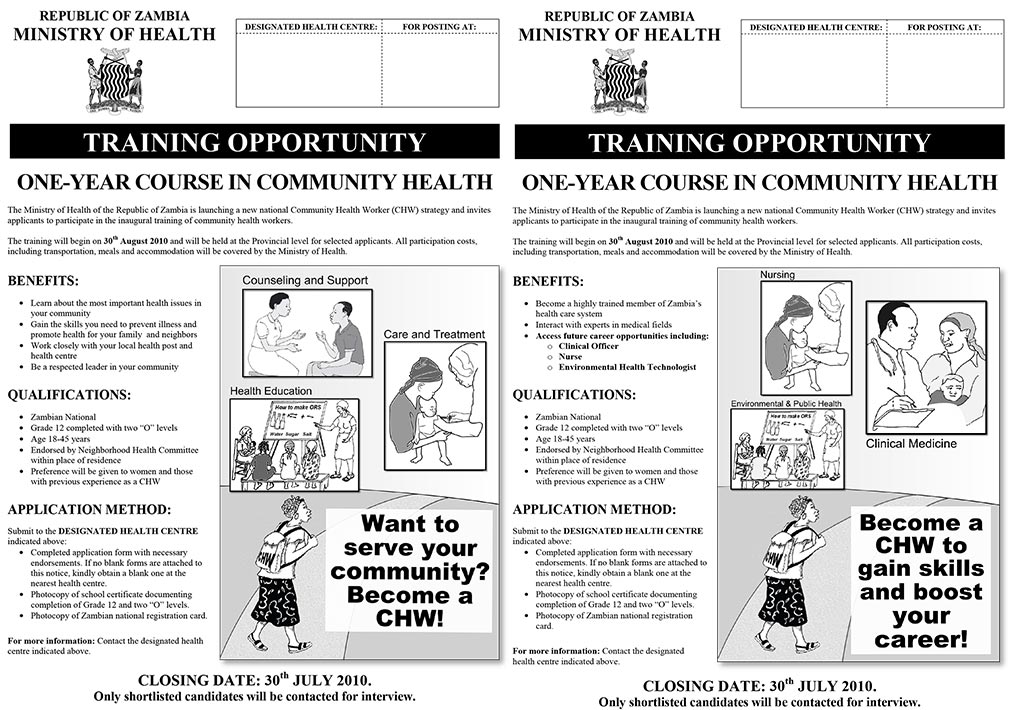Motivating Community Health Workers with Career Incentives
Abstract
The World Health Organization and the Zambian government are using evidence from an IPA evaluation to improve health care delivery.
An evaluation led by researchers from Harvard Business School and the London School of Economics found that when recruiting community health workers in Zambia, emphasizing career incentives rather than social incentives attracted workers who were more qualified and performed better on the job. The workers conducted 29 percent more household visits and organized twice as many community meetings, while also seeing the same number of patients. In 2018, the World Health Organization (WHO) issued a new guideline citing this research in a recommendation that a career ladder be offered to practicing community health workers. The results also influenced that Zambian Ministry of Health to use the career incentives posters in a nationwide recruitment of a new cadre of community health assistants.
The Challenge

Community health workers may be one solution to the shortage of formal health workers in the developing world. Recruited from their communities, trained, and then deployed back to their communities, these workers are thought to have the necessary relationships, local knowledge, and sense of community responsibility to deliver health services to these underserved areas. While small-scale, informal community health worker programs of this kind have existed for years, recently many countries in Sub-Saharan Africa have sought to formalize the cadre and implement national programs at scale.
As the Zambian government got ready to launch their Community Health Assistant (CHA) program in 2010, the Ministry of Health wanted to adopt effective recruitment and motivation strategies for the new cadre. IPA-Zambia had a longstanding relationship with the Ministry of Health in Zambia, especially through Professors Nava Ashraf and Oriana Bandiera. The researchers designed an evaluation in close collaboration with the ministry that addressed the government’s key questions.
The Evidence
The study found that advertising career incentives, such as opportunities for promotion and further professional development, attracted CHAs that were more qualified and had the same level of intrinsic motivation as those recruited with social incentives. The CHAs recruited with career incentives performed significantly better on the job: those recruited with career incentives conducted 29 percent more household visits and organized twice as many community meetings. They also managed to see the same number of patients at the health post and maintain the same quality of care. Furthermore, after one year, retention rates were identical in both groups, but longer-term data is required to establish the long-run effects on retention. Read a full description of the evaluation here.

The Impact
In 2018, the World Health Organization issued a new guideline citing this research in a recommendation that a career ladder be offered to practicing CHWs. The guideline on health system support to optimize community health worker programs cites the study in making the following recommendation: "WHO suggests that a career ladder should be offered to practising CHWs, recognizing that further education and career development are linked to selection criteria, duration and contents of pre-service education, competency-based certification, duration of service and performance review." Read the full guideline here.
The evidence also influenced Zambia's Ministry of Health to help optimize its community health assistant program by using the career incentives posters for a nationwide campaign to recruit a new cadre of community health assistants. Zambia's strategic health plan aims for community health assistants to be the first line of health care for Zambians living in the most remote regions of the country.
Researcher Oriana Bandiera blogs about the study here, and researcher Nava Ashraf talks about how the evaluation illustrates the value of working with partners here.
If you know of other organizations that are using these results, or have any corrections or updates to make to this case study, please contact comms@poverty-action.org.
This work is licensed under a Creative Commons Attribution 4.0 International License.











